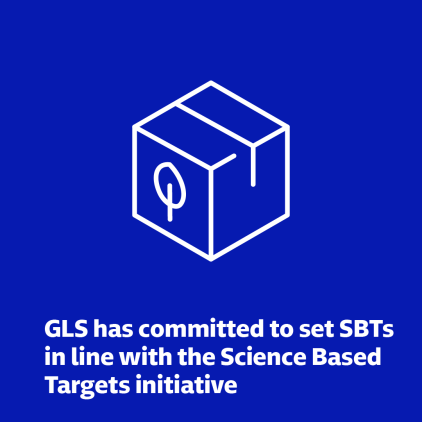News
GLS Group announces commitment to set science-based targets in line with the Science Based Targets initiative
28-March-2024 | Oude Meer

Oude Meer, March 28, 2024 – GLS has committed to set near-term and long-term science-based targets (SBTs) to reduce greenhouse gas (GHG) emissions across its operations in line with the Science Based Targets initiative (SBTi). With this commitment, GLS continues its long-term dedication to environmental protection and reducing its carbon footprint.
Guided by the environmental program Climate Protect, GLS is continuously implementing measures to avoid and reduce its carbon emissions. With the SBTi commitment, GLS is now taking the next step to ensure that its reduction path is in line with the latest climate science.
“We are proud to announce our commitment to set SBTs, which further demonstrates our dedication to sustainability. It ensures that our efforts remain aligned with the latest climate science while we continue to invest in our operations and proceed on the challenging path towards a greener future," said Dr. Karl Pfaff, Chief Executive of GLS.
During the past two years, GLS has nearly doubled the number of zero- and low-emission vehicles*, now counting more than 4,300 vehicles in the transport fleet. It has introduced its first electric trucks in Canada and Italy and continues to test future alternatives, such as a hydrogen-powered truck in Germany. Furthermore, GLS uses renewable electricity in over 80% of GLS-operated buildings.
As part of the commitment, GLS plans to work closely with SBTi to determine GHG emissions reduction targets for Scope 1, 2, and 3. The company expects to submit the developed targets for validation by the SBTi within 2024.
About SBTi
SBTi is a partnership between CDP, the UN Global Compact, the World Resources Institute (WRI) and the World Wide Fund for Nature (WWF). It defines and promotes best practices in setting science-based emission reduction targets and brings together a team of experts to provide independent assessment and validation of targets.
About GLS
GLS Group is one of the largest self-reliant parcel services providers in Europe, with a strong local presence in almost all countries across the continent. It also operates through wholly-owned subsidiaries in Canada and on the USA’s West Coast within one GLS network. This allows GLS to seamlessly connect its customers and communities with millions of parcels and stories every day. GLS’ network connects its markets with high velocity and flexibility to respond to their fast-changing and dynamic nature. The company takes pride in providing its customers across 40 countries high-quality service that best suits their needs. The GLS network consists of over 120 hubs and more than 1,600 depots, supported by approximately 36,000 final-mile delivery vehicles and 6,200 long-distance trucks. This offers network resilience, superior flexibility, and extended reach. In 2022/23, GLS generated record revenues of 5.4 billion euros and delivered 862 million parcels across the markets. For more information, visit www.gls-group.com .
For further information on Climate Protect, please click here .
* This means vehicles that during operation create either sigificantly lower emissions than diesel- and gasoline-powered vehicles (e.g. LPG, CNG or LNG vehicles) or no emissions (e.g. electric or hydrogen vehicles).